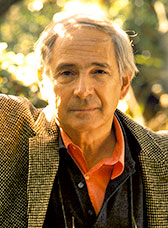John Searle is a leading philosopher of mind, language, and society. He is one of the pioneers of speech act theory and a major contributor to the theories of consciousness and intentionality. In recent decades, he has made seminal contributions to the theory of collective action and intention, and to our understanding of the nature and structure of social reality. He is the Willis S. and Marion Slusser Professor of Philosophy at the University of California, Berkeley.
Searle’s work has had a profound impact on a variety of fields, including cognitive science, psychology, computer science, and linguistics. In the study of language, the publication of Speech Acts (Cambridge 1969) revolutionized how we think about ordinary communicative acts—such as asserting, requesting, and promising—by revealing an underlying complexity that has fundamentally changed our understanding of how the semantic content and force of an utterance interacts with cognitive, social, and contextual factors. In the study of the mind, Searle’s views have generated important debates on some of the most central intellectual questions of our times. His Chinese Room thought experiment provides one of the most enduring critiques of artificial intelligence. It aims to show that programmed symbol manipulation cannot, by its nature, suffice for genuine understanding of language or for thought more generally. In social theory, Searle has proposed an original, nonreductive collective acceptance view of social institutions, which introduces and gives a central role to the concept of a status function in our understanding of their powers and structure.
Many of the philosophical problems that most interest him have to do with how various parts of the world relate to one another—how does it all hang together? How do we get from the physics of utterances to meaningful speech? How do mental phenomena fit into a world consisting entirely of physical particles in fields of force? How can there be an objective world of money, property, marriage, football games, cocktail parties and law courts if the world is exhausted by physical particles arranged in space?
A regular contributor to the New York Review of Books, Searle has written over 200 articles and sixteen books, including Intentionality (Cambridge 1983), The Rediscovery of the Mind (Bradford 1992), The Construction of Social Reality (Simon and Schuster 1995), Rationality in Action (MIT 2001), Mind, Language and Society: Philosophy in the Real World (Basic Books 2008) and Making the Social World (Oxford 2010). His books have been translated into 21 languages.
He is a member of the American Academy of Arts and Sciences and the European Academy of Science and Art, the recipient of eight honorary degrees, and has been a Guggenheim Fellow, the BBC Reith Lecturer, and twice a Fulbright Fellow. He has received the Jean Nicod, Jovellanos, Tasan and Mind & Brain Prizes, the Puffendorf Medal, and the National Humanities Medal.


